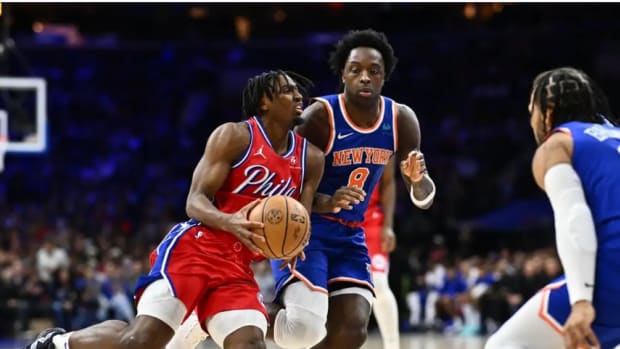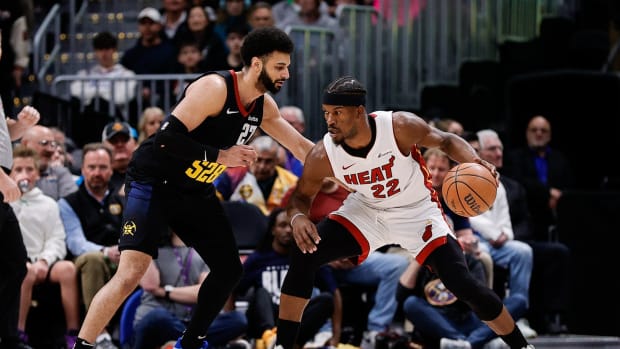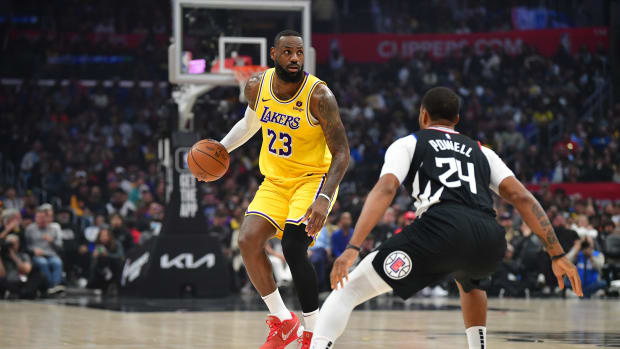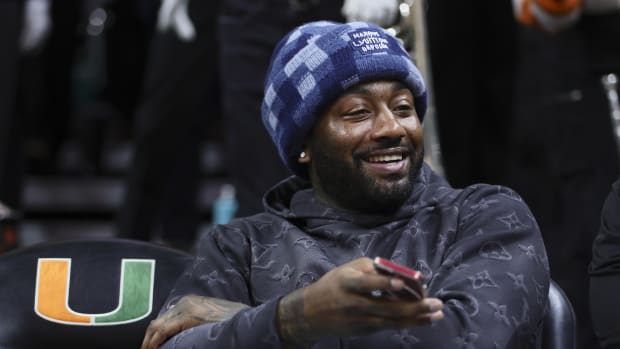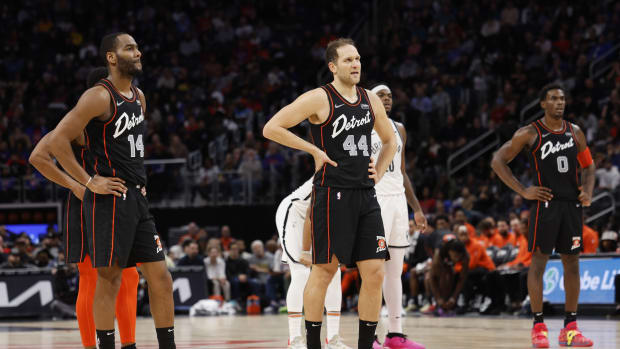NBA Free Agency Report Card: Grading Nets, Knicks, 76ers and More from Crazy Day 1
History will say that 2019 NBA free agency began on Sunday afternoon at 6 pm, but in reality, we've been at this for much longer. Kevin Durant has been at the center of rumors since the middle of last July. The Clippers were circling Kawhi Leonard all season long. Kyrie Irving was linked to the Nets in the middle of the NBA Finals. Anthony Davis was traded to the Lakers 48 hours after Toronto won the title. Al Horford declined his option and prepared to leave Boston 48 hours before the NBA draft. Then, this weekend, Kemba Walker agreed to replace Horford in Boston at least 24 hours before free agency was scheduled to begin.
Given all the prelude, and given all the agreements that were in place before we even made it to 6 pm Sunday, you might have assumed that the actual free-agency period would be anticlimactic. You would have been wrong.
For all the hype that preceded this offseason, I'm pretty sure everything we just saw was even crazier than what most people expected. Al Horford is on the Sixers now, J.J. Redick and Derrick Favors play in New Orleans, Bojan Bogdanovic could shift the balance of power in the West and the Warriors are ready to enter a new era building around Steph Curry and D'Angelo Russell. There's a lot to process here, and we're going to do this with grades. Day 1 free agency report card: here we go.
Nets: B+
This is a tough one, because there are really two stories at play here. On one hand, Sunday night was the culmination of a years-long rebuilding triumph for a franchise that looked really and truly hopeless as recently as three years ago. There were no draft picks after the now-infamous Celtics trade, there were no players worth any meaningful investment from fans or the team itself, and there was no plan for the future. In 2015-16, the Nets won 21 games and entered the offseason with nothing but the 55th pick in the draft. Everything that's happened since is almost like an NBA urban legend. Sean Marks and the Nets front office sought out high-upside picks (they traded into the first round to grab Caris LeVert in 2016), they sought out bad contracts in exchange for assets (DeMarre Carroll, Timofey Mozgov), and they rolled the dice on prospects that had failed elsewhere (Spencer Dinwiddie, D'Angelo Russell).
Progress was incremental through the first two seasons under Marks, then it all came together at once. Last season's team made the playoffs, Russell made the All-Star Game, LeVert had moments where he looked a future star, and then this summer, a fun, overachieving Nets team entered free agency with the chance to sign two superstars and enter an entirely new tier. Obviously, given where this team has been, signing Kevin Durant and Kyrie Irving is a massive win. It's an A+.
But where does this actually lead? I don't ask that question to be pedantic or contrarian. It just seems like there's a chance we're all conflating the indisputable success of this rebuilding story with a future on the court that could be a lot more complicated. Durant is coming off a ruptured Achilles tendon and will likely be unavailable in year one of his new four-year deal. Irving leaves Boston after alienating several teammates and meeting the "Can Kyrie Irving be the best player on a title team?" question by flunking that test in the most spectacular fashion imaginable. Look at his numbers in the Bucks series; after spending most of the season promising the world that the Celtics were not worried because they would be ready for the playoffs, he was shockingly overmatched when that moment actually arrived.
I don't know. Expectations will be high both externally and internally, and that adds pressure that could complicate whatever comes next. Brooklyn has a more stable infrastructure than the Knicks would have given these two stars, but no amount of Caris LeVert hype or Kenny Atkinson coaching is enough to allay the broader concerns here. Irving is 27 years old with a concerning injury history and renewed questions about his leadership; Durant is 7'0" tall and set to embrace a grueling rehab process. I think it's cool that they signed DeAndre Jordan and Kyrie and KD took less to make it happen, but do people remember what Jordan looked like during his first few months with the Mavs last year?
Even if Durant and Kyrie were both perfectly healthy, there would be reasonable questions about how clean the fit would be. At the moment it looks like it may be another 16 months before we're able to see how either star answers those questions. There's a chance that once that moment arrives, the Nets will look like a title contender. There's also a not-insignificant chance that they won't. And then what?
Jazz: A
The Jazz are another tricky one. Utah has spent the past three weeks filling out its rotation with some of basketball Twitter's favorite players—Bojan Bogdanovic, Mike Conley, Ed Davis—and there's a chance the world is going to get a little too high on the Jazz on the way into next season. They are like a title contender designed specifically for people who spend too much time on Basketball Reference.
There are risks to consider here. Bogdanovic is good and he should fit well as a stretch four—I like him better than Nikola Mirotic, a one-time Jazz target who wound up returning to Europe— but at 30 years old, it bears mentioning that he's coming off by far the best season of his career (18 PPG, 4.1 RPG, 42% 3FG). Can he recreate those numbers? What's more, the Jazz just gave away Derrick Favors, a player who's been sneaky invaluable as an insurance policy for sporadic Gobert injuries through the years. And finally, while we're playing devil's advocate, the ceiling for this team is still entirely dependent on how reliable Donovan Mitchell can be going forward.
The good news is that with Bogdanovic and Conley in the mix, Utah has finally found a way to surround Mitchell with pieces that can optimize his skills and mitigate his weaknesses. The Jazz will have spacing for the first time in years, and Bogdanovic should be able to bury a lot of the shots that Jazz wings were missing during this year's closer-than-it-looked five-game loss to the Rockets. If they stay healthy and Mitchell continues his progress, the Jazz will enter next year's playoffs with a starting five that's more balanced than just about anyone in the league.
More than anything, I like this summer for the Jazz because the entire league sees an opening at the top of the West, but nobody has responded as aggressively or as effectively as Utah. With Mitchell still on his rookie deal, this was Utah's best chance to go all-in for a team that could go to the NBA Finals. VP of Basketball Operations Dennis Lindsey and GM Justin Zanik are not only seizing that opportunity, but they have done so by assembling a nucleus that's about as interesting as anyone could have dreamed as recently as a few weeks ago. The fit is clean, most of these guys are tough and in the middle of their prime and the Jazz will be really good next year.
Sixers: A
First and foremost, we have to commend the Sixers for remaining weird as hell at all times. No one was sure how Philly would play this offseason, and 90 minutes into free agency, we still had no idea. Shortly thereafter the dominoes began to fall. Tobias Harris is back on a five-year deal worth $180 million. Al Horford is coming on a four-year deal worth somewhere between $97 million and $109 million, depending on incentives.
With Horford in the mix, Jimmy Butler is on the way out. Assuming the sign-and-trade doesn't fall through at the last minute, Butler will sign with the Miami Heat, and because the Heat lack the cap space to sign Butler, the Sixers will get Josh Richardson in return for facilitating the deal. Adding Horford is a risk because of Horford's age and some fairly reasonable fit concerns that may arise on a team that's now full of gigantic players. But I like it. Paying Horford roughly $25 million per year is preferable to bringing back Butler on a five-year deal worth $190 million. Horford and Embiid can platoon their way through the regular season, and by playoff time, they will give Philly the best defense in the NBA. Richardson isn't as good as Butler, but he's less domineering, and being the fifth-best player on a title contender is probably a much better role for him than trying to carry the Heat every night.
The Sixers entered free agency faced with the choice between massively overpaying for an an underwhelming nucleus or losing one or multiple stars for nothing after sacrificing almost every asset the team had in two blockbuster deals to acquire them this year. Either outcome would have been daunting, but the Sixers found a third option. Now they have Horford on board to double down on this team's greatest strengths—size, mobility, defense—and Richardson arriving to help mitigate the losses of Butler and Redick.
All of this will be a work in progress, but that's always true with this team. The future hinges on Embiid's health and conditioning and the progress that Simmons can make as a scorer. Nothing is guaranteed on either front, and there will probably be an adjustment period as the team learns to run an offense without relying on 75 dribble-handoffs between Embiid and J.J. Redick in every game. What Sunday did, though, was ensure that the Sixers will have a shot at a title if the franchise players can check the requisite boxes. That's all any team can hope for in free agency.
Knicks: D
It's never a good sign when the team president has to issue an apology on the first night of free agency. "While we understand that some Knicks fans could be disappointed with tonight's news," Steve Mills said, "We continue to be upbeat and confident in our plans to rebuild the Knicks to compete for championships in the future, through both the draft and targeted free agents." But perhaps that statement was necessary because of the way this team has approached this offseason all year long. "I can tell you," James Dolan said in March, "From what we’ve heard I think we’re going to have a successful offseason when it comes to free agents."
One silver lining: regardless of whether you believe sources who contend that it was actually the Knicks who decided to bow out of the race before KD went elsewhere, missing on Durant could very well be a blessing in disguise. No one has any idea how healthy KD will be, and that would have made it harder to recruit players around him this summer. In that case, if the Knicks were going to bring him to New York to play by himself, there were no guarantees the team would ever contend for a title with Durant as the centerpiece. Without KD, the Knicks have retained flexibility for the future, R.J. Barrett provides hope for the short term and the outlook isn't as hopeless as it has been in, say, a dozen other Knicks seasons over the past 25 years.
On the other hand: Dolan still owns the team and he may own the team forever, this Knicks summer will live on in infamy alongside a list of basketball atrocities that is remarkably long, and the "build around our young players" plan would be more heartening if the Knicks didn't respond to the Durant strikeout by immediately signing three power forwards to play with Barrett. Julius Randle is one thing, and you can maybe even talk me into Taj Gibson, but I have to draw the line at Bobby Portis.
Good news, though: We can do all of this again in 2021.
Bucks: B-
The good news is that the Bucks will bring back Brook Lopez and Khris Middleton, two crucial players who fit perfectly with Giannis Antetokounmpo. The price tag was expensive (five years, $178 million for Middleton; four years, $52 million for Lopez) but the Bucks are close enough to a title to pay a premium for continuity. They brought back George Hill on a reasonable deal (three years, $29 million) which counts as another modest victory. They also added Robin Lopez, Brook's brother, to help fill out the bench.
The bigger issue in Milwaukee is losing Malcolm Brogdon, a player who spent the Eastern Conference finals looking much better suited to playoff basketball than Eric Bledsoe. The price tag for Brogdon was arguably unreasonable and would have consigned the Bucks to paying the luxury tax, but again, the Bucks have a two-year window to chase a title before Giannis Antetokounmpo decides on his future in Milwaukee. If there were ever a time to overpay and incur luxury tax payments, this is it. Keeping Giannis ensures that everyone invested will eventually double or triple their money, but the Bucks have to prove they can win before Giannis agrees to stay. Brogdon could have helped the cause.
Sidenote: if the Bucks hadn't extended Bledsoe back in March and instead waited until Bledsoe's playoff demons returned against the Raptors while Brogdon thrived, would they have been more inclined to use that money to pay Brogdon going forward? The Bledsoe deal made sense at the time but it hasn't aged well. With Brogdon gone there will be even more pressure on Bledsoe to perform. It was a win to get picks from the Pacers in exchange for Brogdon, and maybe those picks can be flipped for valuable role players at some point before next year's playoffs. In the meantime, the Brogdon/Bledsoe choice will loom over this team.
Pacers: C
The Pacers don't have many paths to young stars, so maybe that's why they felt like gambling on four years of Brogdon's prime was the right play. His numbers last year were excellent (15.6 PPG, 4.5 RPG, 3.2 APG, 50.5% FG, 42.6% 3FG) and he's only 26 years old. Still, 4 years and $85 million is a daunting price to pay for that kind of production, and that's before you consider the injury risks (he was red-flagged in the draft because of injury concerns; he played 48 games in 2017 and 64 games in 2018). A healthy version of Brogdon fits well next to a healthy version of All-NBA Victor Oladipo, but there are some pretty obvious risks baked into any long-term bet on that partnership. Brogdon made a ton of sense as a complementary piece on a title team; as a foundational piece in Indiana, I'm less sold.
Pelicans: B
The Pelicans get a B for the same reason the Nets get a B+. The plan here has been executed about as well as anyone could have hoped. The Pelicans added J.J. Redick to help fill out the nucleus this year, and they'll also add Derrick Favors from the Jazz to start at center. Both moves are good short-term investments that won't hamstring any long-term flexibility. The question is whether any of this will actually work as well as the Pelicans hope:
Everyone seems to love what the Pelicans have done this summer, so maybe I'm the crazy one. But a) the depth chart above has a lot of question marks if the goal is a playoff berth in the West, and more generally b) I'm not sure why this front office felt compelled to build around Zion as quickly as possible. That said, Redick's shooting will help Zion breathe, and that deal made a ton of sense. Whatever happens with everyone else, the Pelicans have succeeded in guaranteeing that every fan in the NBA will want to watch this team next season.
Heat: B
The Heat get a B here because we are assuming that they will find a way to complete the Butler deal and then continue to build over the next few weeks. Butler isn't perfect as a superstar and at 29 years old a four-year deal is a gamble, but he provides a much-needed win for Miami after years coming close on stars in July. Also, a nice resolution to Pat Riley and Tom Thibodeau's alleged conversation back in October.
Butler is a big name who has wanted to play in Miami all year, and he can potentially attract other stars to South Beach. In the meantime, he's a better player than Richardson and he can make the Heat more competitive than they have been for the past few years, particularly if Miami can continue to tinker with the rest of the roster and add some shooting around him. And while we wait to see what other moves are coming as the roster takes shape, I have to include this tweet:
That describes the Heat for at least the past five years. It's part of their charm, really.
Rockets: B
The Rockets didn't trade for Jimmy Butler and instead will run it back with a nucleus that makes a lot more sense than Jimmy Butler, Chris Paul, and James Harden. Granted, Paul and Harden may or may not loathe each other at this point, but the Rockets missing on Jimmy seems like it could be a blessing in disguise.
Celtics: B+
I wrote about Kemba Walker in Boston last week: He is going to make that team in the Eastern Conference answer to the Blazers, and if Jayson Tatum and/or Jaylen Brown can take a step forward, next year will be a lot more fun than last season. In general, Kemba was a phenomenal save after a truly horrific month. Now let's see if this team can find a big man over the next few days.
Hornets and Suns: D
All of these decisions make me sad.
Mavs: TBD
This situation is still fluid, but it appears the Mavs a) sat out the first day of free agency and watched several targets sign elsewhere, because b) they were negotiating a deal with the Heat that appears to have fallen apart. The Heat were initially trying to trade Goran Dragic to Dallas, a move that would have made a decent amount of sense, particularly given Dragic's perimeter shooting and history with Luka Doncic (they won EuroBasket playing for Slovenia in 2017). The deal was scuttled because of a misunderstanding that hearkens back to the great Brooks fiasco of January 2019. The Mavs wanted Kelly Olynyk and Derrick Jones Jr.; the Heat needed to offload Dragic to make the Jimmy Butler deal happen. Now the Mavs have lots of cap space and fewer candidates to sign.
Just as important: Why does a team with Kristraps Porzingis, Dwight Powell, and Maxi Kleber need Kelly Olynyk more than Goran Dragic? I'm not sure. The Mavs are one free-agency player that entered this offseason with a chance to add reinforcements and jump into the middle of the West playoff race. We'll see if they can salvage things over the next few days.
Wolves: D
Karl–AnthonyTowns made the James Dolan mistake on Sunday, jinxing a potential Russell union, while it sure sounds like the Wolves spent all week trying in vain to trade Andrew Wiggins. Not ideal. On the bright side: Towns is still incredible, and there's always a chance that Russell will be available via trade sometime in the next 12 months.
Warriors: B+
I have no idea how D'Angelo Russell will fit next to Steph Curry and neither does anyone else. What we do know: a team that's losing a superstar almost never has the chance to add a 23-year-old max player in a sign-and-trade. This is a win. Russell can provide short-term scoring punch next year and long-term flexibility that will be far more important. There was always going to be limited room to build this team as Klay Thompson and Steph Curry become more expensive (Thompson is expected to sign a five-year, $190 million deal this week). Adding Russell gives Golden State help next year, and potentially a valuable trade asset to use as they begin the process of charting a course for the next five years with Curry, Klay, and Draymond Green. (For Russell, he's able to lock in a max deal that wasn't guaranteed to be there elsewhere on the market).
More moves are coming, but when Durant told the Warriors he was leaving on Sunday morning, that should've marked the end of Golden State's reigin for the foreseeable future. It didn't take 12 hours before we began to see some surprising signs of life.
The Lakers: INC
Half the role player targets are already off the market, while D'Angelo Russell, Irving, and Jimmy Butler off the board as well. The Lakers need a star and they now are waiting on Kawhi Leonard. As crazy as Day 1 may have been, the biggest story in basketball is what happens next in L.A.

































